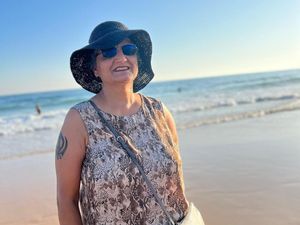Macmillan support worker urges people to 'listen to their bodies' if something doesn’t feel right after ovarian cancer diagnosis
A Macmillan support worker is urging people to “listen to their bodies” if something doesn’t feel right following her own diagnosis of ovarian cancer.

Pavitter Mainn, Macmillan Cancer support engagement lead across the Black Country, is raising awareness of how ovarian cancer signs can be vague and hard to spot.
The 63-year-old mother of two had constant stomach pain and had unusual discharge, which was put down to the menopause.
But listening to her body, she was persistent and contacted a healthcare professional for further tests.
After spending two weeks in hospital and receiving a diagnosis of stage one ovarian cancer, she underwent a full hysterectomy in 2016 followed by five sessions of chemotherapy.
Fast forward to 2022, and Pavitter’s ovarian cancer returned but was under control with help from the gynaecology service at The Royal Wolverhampton NHS Trust (RWT).
She said: “I was so worried when my cancer returned but I knew straight away as my bladder felt very heavy.
"I called the gynaecology service at RWT and was seen straight away I’m so thankful for their care.
"Without them and my family, I wouldn’t be here today.”
Grandmother Pavitter, from Wolverhampton, enjoys her role as an engagement lead for Macmillan so much that she creates engagement sessions across the Black Country.
“I’m so passionate about empowering individuals to look after their health," she said.
"Over the last few years I have been teaching expert patient programmes on a voluntary basis within the community.
“Having worked in a cancer support environment, I had lots of information and links to professionals who deal with cancer issues every day."
Alison Cooke, gynae-oncology clinical nurse specialist, has cared for Pavitter since her diagnosis.
She said: “It is important to be body aware and to seek medical advice with any concerns. Making a note of any symptoms you get in a diary can be helpful before you see your GP.”
This Ovarian Cancer Awareness Month, Pavitter has a clear message.
She said: “There is no shame in talking about cancer – your experience may help someone to open up and get help.
"Since my diagnosis, I’ve learnt that ovarian cancer signs are hard to diagnose. It’s important you access tools from the NHS to learn about different cancer symptoms.
“My advice to any women is that if you have any concerns around your health, don’t suffer in silence.
"Speak to your friends, family and, most importantly, to your GP.
“If you don’t feel comfortable speaking to a male GP, ask for a female or go to a sexual health clinic.
"Please don’t leave any unexplained lump, pain or bloating to chance. If you are worried, get checked. All healthcare professionals are here to help.”




